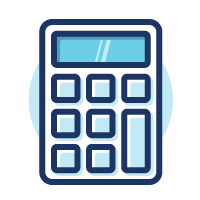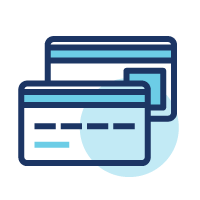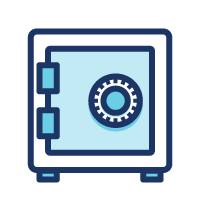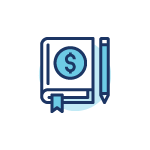How to Improve Your Credit Score in 7 Simple Steps
Start by looking over your monthly credit reports for errors, then work to catch up on overdue payments and pay down revolving credit balances each month. Avoid missing monthly payments to build your credit score.

What We'll Cover
- How a credit score works
- How to view your credit report
- How to determine your credit utilization ratio
- How a missed payment impacts your credit score
Improving your credit score is an important step in building a solid foundation for financial wellness. With a higher credit score, you will enjoy greater savings and better terms on things like a mortgage, an auto loan, and in some cases auto insurance premiums.
A damaged credit score can also make it harder to rent an apartment and gain access to certain services. It could even keep you from securing certain jobs.
Improving your credit score doesn’t have to be difficult. It’s all about knowing how your score is calculated and what healthy habits you can build to move your score in a positive direction.
The Credit Score Breakdown
First, you need to understand what makes up the credit score .
There are five areas of the credit score and each one of them are weighted differently. The breakdown is as follows:
How is Your Credit Score Calculated?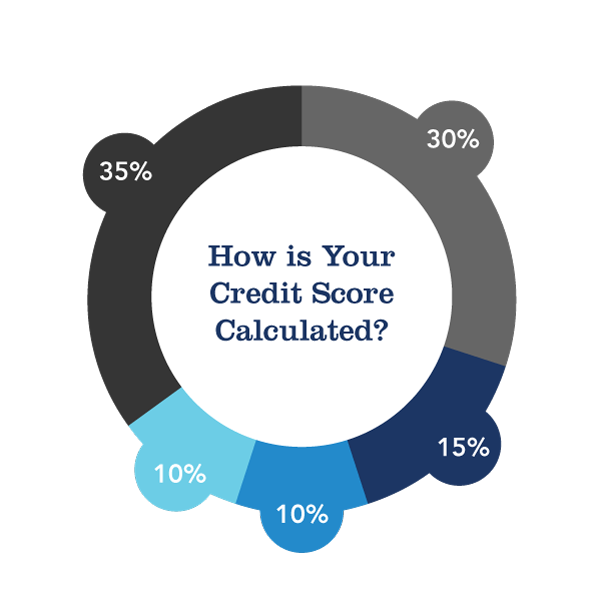
Payment History (35%)
Your history of borrowing money and paying it back on time is the best way for lenders to decide how much they trust you.
Amounts Owed (30%)
Lenders want to see how much debt someone has compared to the amount they have available to borrow.
Length of Credit History (15%)
A longer credit history gives lenders a better idea of a borrower's behavior with borrowing money.
Credit Mix (10%)
If a lender can see the borrower is able to manage a mortgage, a student loan, and a credit card, then this makes the borrower less of a risk to the potential lender.
New Credit (10%)
New credit can both increase and decrease the overall score.
As you can see, 65% of your credit score is made up of your payment history and the amount of debt you have.
Therefore, we will first focus on these two areas of your credit score when it comes to creating the greatest impact when improving your score.
7 Ways to Build and Improve Your Credit
If your credit could use a facelift, the good news is there are things you can do to improve your credit score.
Some of these things you can do right away and some will be done over the next few weeks and months:
- Look over your credit reports from each of the three credit bureaus.
- Make your monthly payments on time.
- Catch up on overdue amounts.
- Pay down your revolving credit balances each month.
- Make frequent payments on all debts each month.
- Ask for higher credit limits.
- Become an authorized user.
1. Look at Your Credit Report for Errors
Yes, believe it or not there are often errors on credit reports. In fact, a recent study by Consumer Reports found a third of Americans discovered errors on their credit reports.
Every American is entitled to one free copy of their credit report every 12 months from each of the three credit bureaus. With three different credit bureaus – Equifax, TransUnion and Experian – you can get all three credit reports at once or spread them out throughout the year.
Once you have your three credit reports in hand, go through and check for errors. Some things to keep an eye out for are debts you didn’t sign for, errors with a missed payment, or mistakes in the amount of outstanding debt.
If you find any errors in your credit reports, don’t hesitate to contact the credit bureaus to dispute mistakes. You can do this online, by phone or through the mail. Correcting errors on your credit report is a simple and effective way to improve your credit score.
Pro Tip: You can visit each of the three credit bureaus at Equifax, TransUnion or Experian.
2. Make Your Payments On Time Each Month
Did you know a missed payment will stay on your credit report for up to seven years?
Keep in mind, a missed payment is different from a late payment. Let’s assume your minimum payment is due on the 20th of the month and because you were busy doing 27 other things, you forgot to make the payment on time. Therefore, your payment is late, and you may incur a late fee.
However, if you wait more than 30 days to get caught up on the late payment, then your payment is considered a missed payment and the missed payment will stay on your credit report for the next seven years.
The bottom line is, do everything you can to avoid a missed payment. If you have a credit card, make sure to at least make the minimum payment so you’re not missing payments and hurting your credit score. Remember, late payments may cost you a fee, but a missed payment will create a large dent in your credit score. Conversely, a pattern of on-time payments will improve your credit score over time.
3. Catch Up On Overdue Amounts
Now that you know the importance of making payments on time, it’s time to start catching up on overdue payments.
This is always easier said than done, so let’s break it down to bite-size pieces.
The first step is to make a list of all payments that are overdue. Then list them in order of the most overdue to least overdue in terms of days late (30 days, 60 days, 90 days).
From there it’s time to start squeezing the budget and adding income to each month with a side hustle or part-time job. Start identifying the wants versus the needs in your monthly spending to decide what you may need to go without for the next few months while you get caught up.
Lastly, contact your creditors and see if they’re willing to work out a payment plan with you. Determine how much you can pay each month towards each creditor and then contact them to set up a payment plan. Many creditors will work with you, but make sure you contact them with a plan of action instead of having them set one up for you.
4. Pay Down and Pay Off Revolving Balances
Beyond missed payments, the amount of debt you have on your credit report is the next largest factor affecting your credit score.
One way to boost your credit score is to lower your credit utilization ratio by focusing on the revolving credit.
Revolving Credit: These are credit cards, personal lines of credit and home equity lines of credit (HELOCs). Revolving credit is open ended, meaning there isn’t an end date. Unlike auto loans, mortgages and home equity loans, revolving credit can be accessed over and over again.
To determine your credit utilization ratio, add up the total revolving debt you have and divide that by the total available credit. For example, a revolving debt amount of $10,000 with a maximum credit limit of $20,000 equals a credit utilization of 50%.
A good rule of thumb is to work on keeping your credit utilization below 30%.
Pro Tip: Pay down the balance before the statement closing date to help improve your credit score faster. Credit companies report the balance on the account at the statement closing date, not the payment due date.
5. Make Frequent Payments
Making multiple payments each month will not directly improve your credit score, but the results of multiple payments each month might.
The credit reporting agencies do not track the amount of payments you make towards your revolving debt. However, when making frequent payments, you’re more likely to avoid missed payments and lower the ratio between the amount you owe versus the amount you can borrow, while bringing down the principal balance of your loan.
6. Ask for a Higher Credit Limit
Another way to lower your credit utilization so you can raise your credit score is to contact your credit issuer and ask for an increase with your credit limit.
Keep in mind, you must be in good standing with your credit issuer for this to work, and you will experience a hard pull inquiry on your credit report.
This will have an immediate effect of lowering your credit score, but soon your score will begin to increase with on-time payments and a lower credit utilization.
7. Become an Authorized User
An authorized user is someone added to a credit card account by the primary card holder. As an authorized user, you benefit from the primary cardholder’s credit behavior and their payment history. While this strategy won’t have a huge impact on improving your credit score, it does help those just starting to build their credit.
The key is to find someone with a very low credit utilization and a long history of on-time payments. When the primary card holder adds you as an authorized user to one of their credit cards, they are on the hook for any charges made by either of you.
Pro Tip: The authorized user does not have to use or even possess the credit card. This is often a good practice, especially if the primary account holder and authorized signer are hesitant to mix money with family or friendships.
Frequently Asked Questions
I’m sure you still have many questions about improving your credit score. Before you overthinking it, remember, creating a budget, planning to make on-time payments, and paying off debts will help your score improve.
However, here are some of the answers to the most-common questions when it comes to improving your credit.
Does Closing Out a Credit Card Hurt My Score?
Yes it can, but the negative impact won’t last forever.
As you recall from above, your credit score is based on many factors, and closing out an account can have a negative effect by decreasing the average time for your credit accounts and by also lowering the amount of available credit you have.
For example, let’s assume you pay off your credit card that you’ve had for five years with a credit limit of $10,000. By closing the account, you will get rid of the five years of having the card, which shortens the average age of all of your credit accounts. Also, your overall available credit will decrease by $10,000, which will increase the ratio of debt to credit available. However, keep in mind this dip in your credit score will not last forever. In fact, if you continue to pay down your balance, your debt to credit available ratio will increase, which will have a positive effect on your credit in the long run.
Will Paying Only the Minimum Payment on my Credit Cards Improve my Credit Score?
No. It’s never a good idea to make only minimum payments in order to improve your credit score. In fact, the opposite is true — make more than minimum payments each month to pay down the overall balance and improve your credit score. You could also go a step further and pay off your balance in full each month. This allows you to avoid paying interest while also improving your credit score.
How Long Does it Take to Improve my Credit Score?
There is no magic number of days, weeks, or months to when your credit score will be improved. A lot has to do with your current credit situation and what you do in the next few weeks or months to improve.
The things that will move the needle on your credit score the most are the things that make up the biggest chunks of your credit: payment history (35%) and amount of debt (30%). For example, if you have a history of missed payments over the past few years, then it’s going to take a few months of on-time payments to improve your credit score.
On the other hand, if you currently have a large balance on a credit card and you pay the balance off within the month, you’ll notice a drastic improvement within the first 30 - 60 days.
Should I Open a New Credit Card to Improve my Credit Score?
Before asking whether to open a new credit card to improve your credit score, make sure you’re correcting other issues that may be dragging down your credit.
If your credit score is low because of too many missed payments and a large balance, then adding another credit card to your wallet may only make things worse. Instead, focus on paying down your current balance by creating a plan and then following the plan.
This may include creating a budget and then adding income to throw at your current balance until the debt is wiped out.
Key Takeaways
- Correcting errors on your credit report is a simple and effective way to improve your credit score.
- If a payment is more than 30 days late then it’s considered a missed payment, which will stay on your credit report for the next seven years.
- Work on keeping your credit utilization below 30%.
- Becoming an authorized user can help someone start building credit.
An improved credit score will give you access to better rates and terms on things like an auto refinance, home mortgage, or even a personal loan. However, it’s just as important to realize a good credit score does not necessarily have any indication on your financial wellness.
The only factors affecting your credit score have to do with borrowing money. Therefore, it’s fair to say someone who hasn’t borrowed money in over 7 years could have saved millions of dollars in the bank and still not have access to a loan based on their lack of credit.
With that said, always focus on creating and sticking to a budget. Create a habit of saving money each month, pay off your debt, and focus on a strong financial foundation before throwing all your efforts at the almighty credit score.
Chris “Peach” Petrie is the founder of Money Peach. Money Peach partnered with OneAZ to provide free financial education to members across the state. To learn more about OneAZ’s partnership with Money Peach, click here.
APR = Annual Percentage Rate


